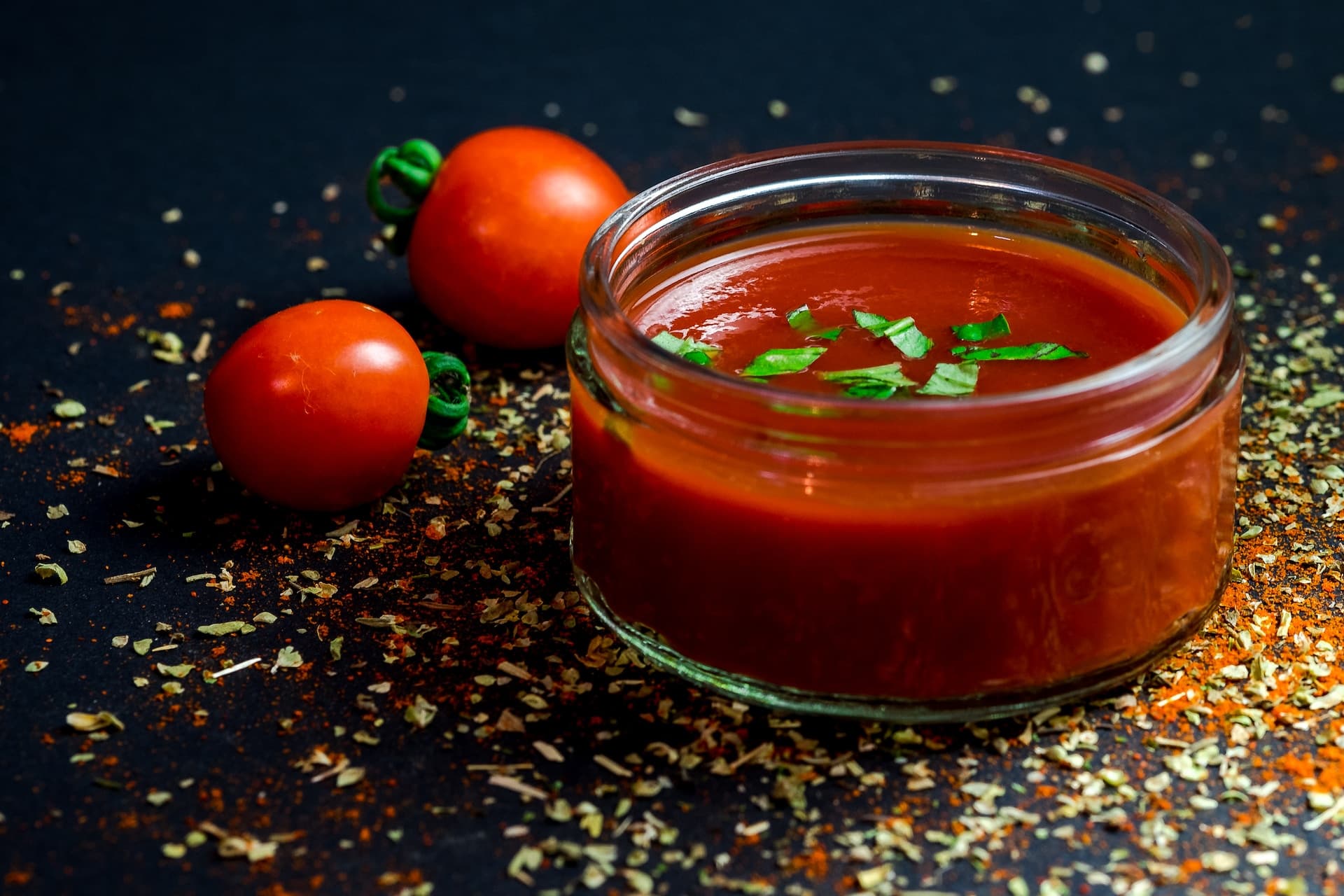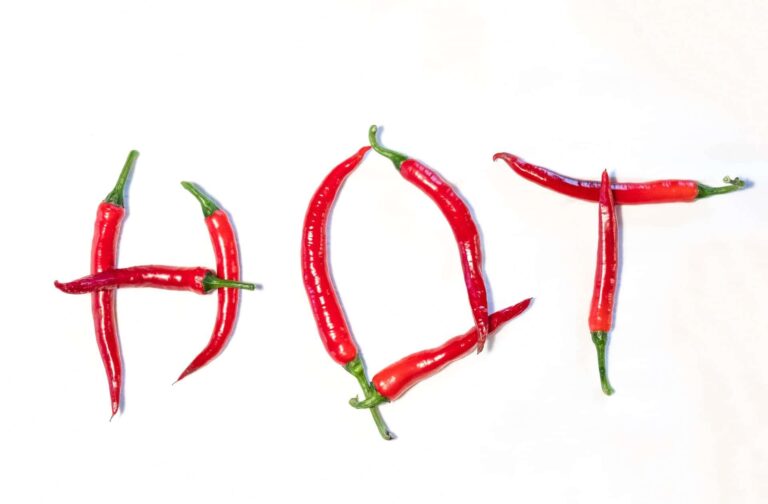Hot sauce. Is hot sauce good for you? We pour it on eggs, drizzle it onto tacos, and even puree it into soups to bring a meal from drab to delicious. Heat lovers know hot sauce is tasty—an indulgence, even.
Something as mouthwatering as hot sauce must be bad for your health, right? Think again.
Hot sauce contains multiple health benefits, from antioxidants and anti-inflammatory properties to appetite suppression and blood pressure control.
What Makes Hot Sauce Healthy?
Hot sauces are made with chili peppers, a fruit in the nightshade family with a reputation for heat. Chili peppers are low in calories and packed with nutritional value.
Chili peppers contain capsaicin, the naturally occurring phytochemical responsible for spiciness in peppers with a wide range of health benefits.
Let’s look at both pieces separately to understand their impact on health:
Health Benefits of Capsaicin
Capsaicin has been a dietary staple for thousands of years and, medicinally, is used as a homeopathic remedy to treat various conditions, including osteoarthritis and gastropathy. [1]
Capsaicin can be used topically and orally to treat pain, fight inflammation, and support weight management.
Health Benefits of Chili Peppers
According to the U.S. Department of Agriculture, chili peppers are low in fats, carbohydrates, and calories and contain fiber, vitamins, and minerals. [2] These spicy fruits boast:
- Vitamin C: Chili peppers beat oranges 3 to 1 in terms of vitamin C, a powerful antioxidant for wound healing and immune health.
- Vitamin B6: B6 plays a critical role in energy metabolism.
- Vitamin K1: Also known as phylloquinone, vitamin K1 is essential for blood clotting and healthy bones and kidneys.
- Vitamin A: Chili peppers contain beta carotene, which the body converts into vitamin A. Vitamin A is essential for vision, the immune system, reproduction, and growth and development.
- Potassium: Potassium is an essential mineral that is needed by all tissues in the body. The Harvard School of Public Health says potassium’s primary role is maintaining normal fluid levels inside our cells. [3]
What Is The Nutritional Value Of Hot Sauce?
Hot sauce is low in calories and free of carbs, fat, and protein, making it an excellent way to flavor your food without detrimenting nutritional value.
Per the United States Department of Agriculture (USDA), one teaspoon (5 mL) of hot sauce averages [4]:
- Calories: 0.5
- Protein: 0 grams
- Fat: 0 grams
- Carbs: 0 grams
- Vitamin C: 4% of the daily value (DV)
What Are The Health Benefits Of Hot Sauce?
Most advantages associated with hot sauce consumption are thanks to capsaicin, that spicy element within chili peppers. The health benefits of consuming capsaicin-rich hot sauces are plenty and include:
Weight Loss
A 2017 study at Mahidol University shows capsaicin has potential as an antiobesity substance.
Capsaicin induces body weight reduction, satiety or sensation of fullness, and energy expenditure while reducing energy and fat intake. [5]
Heart Health
Capsaicin possesses noteworthy analgesic and anti-inflammatory properties that contribute to heart health by preventing plaque buildup on blood vessel walls. [6]
A study published in the Journal of the American College of Cardiology (JACC) observed that people who eat chili peppers four times a week or more were 40 percent less likely to die from a heart attack than those who do not regularly consume chili peppers. [7]
Cancer Prevention
While more research is needed, studies show promising signs that capsaicin may slow the growth and spread of specific cancer cells.
Researchers from the University of Maryland Department of Nutrition and Food Science found that capsaicin alters the expression of several genes involved in cancer cell survival, growth arrest, angiogenesis, and metastasis. [8]
Diabetes Management
Hot sauce can help manage diabetes. A 2017 American Society for Clinical Nutrition study showed that diabetes patients who had a spicy meal had more normalized insulin levels than those who ate a meal without capsaicin. [9]
Scientists argue that chili pepper consumption may improve the sensitivity of tissues to insulin, and less insulin will be required to move glucose from the blood to tissues effectively.
Improved Mood
Consumption of hot sauce and other spicy foods releases endorphins and dopamine, creating euphoria similar to a “runner’s high.”
Endorphins diminish the perception of pain, reduce stress, enhance our feelings of pleasure, and have a calming effect. Scientists argue that the pleasurable impact of endorphin release is why we enjoy spicy foods.
A 2022 study conducted at The Medical University of Warsaw found that regularly consuming capsaicin can even reduce symptoms of depression. [10]
Is Hot Sauce Unhealthy?
Not all hot sauces are good for your health. Hot sauces packed with artificial ingredients and too much sodium can dull your meal’s nutritional value, especially if you’re following a low-sodium or heart-healthy diet.
Artificial Ingredients
Although the spicy condiment fits a healthy, rounded diet, some hot sauce brands contain additives, dyes, preservatives, sugar, and elevated amounts of sodium.
Sodium
A Chronic Disease Risk Reduction (CDRR) lists 2,300 milligrams a day as the maximum amount of sodium for men and women 14 years and older. Most people in the U.S. consume more sodium than the CDRR guidelines. [11]
According to the Harvard School of Public Health, too much sodium in the diet can lead to high blood pressure, heart disease, stroke, calcium loss, weight gain, sleep disturbance, and dehydration. [12]
Is There A Such Thing As Too Much Hot Sauce?
Are you opening your second bottle of hot sauce this week and wondering how much is too much? Like anything, overconsuming hot sauce is possible, especially if you choose a product loaded with sodium and harmful ingredients.
Overeating hot sauce can lead to adverse effects, such as:
- Acid Reflux: Consuming too much hot sauce can lead to acid overproduction in your stomach, disturbing the digestive system and causing gastroesophageal reflux.
- Bloating: Hot sauce contains ingredients high in fiber and oligosaccharides, which produce gas in the digestive tract.
- Cardiovascular effects: Too much sodium in your diet can cause blood clotting, making you prone to heart attack and stroke.
Choosing A Healthy Hot Sauce
To make the most of hot sauce’s health benefits, read the nutrition label carefully and avoid products made with the following artificial additives, preservatives, or food dyes:
- Sodium benzoate
- Potassium sorbate
- Sodium bisulfate
- Xanthan gum
Opt for hot sauces containing simple ingredients that you recognize, such as peppers, vinegar, spices, and salt.
The Bottom Line
Hot sauce is typically low in calories and free of carbs and fat.
It contains nutrients such as vitamin C, A, and capsaicin, which are associated with considerable benefits for human health.
However, hot sauce can be made with unhealthy ingredients and high amounts of sodium.
To maximize hot sauce’s health benefits, choose a product low in sodium and free of artificial ingredients or harmful additives.
Sources
[1] Chang, A., Rosani, A., Quick, J. “Capsaicin.” In: StatPearls. StatPearls Publishing, 2023.
[2] “Peppers, Hot Chili, Red, Raw.” FoodData Central. U.S. Department of Agriculture, 2019.
[3] “Potassium | The Nutrition Source.” Harvard School of Public Health, 2023.
[4] “Sauce, Ready-to-Serve, Pepper or Hot.” FoodData Central. U.S. Department of Agriculture, 2019.
[5] Narang, N., Jiraungkoorskul, W., Jamrus, P. “Current Understanding of Antiobesity Property of Capsaicin.” Pharmacognosy Network Worldwide, 2017.
[6] Williams, V. “Mayo Clinic Minute: Capsaicin’s Connection to Heart Health.” Mayo Clinic, 2020.
[7] Bonaccio, M., et al. “Chili Pepper Consumption and Mortality in Italian Adults.” Journal of the American College of Cardiology, 2019.
[8] Clark, R., and Lee, S. “Anticancer Properties of Capsaicin Against Human Cancer.” Anticancer Research, 2016.
[9] Ahuja, K., et al. “Effects of Chili Consumption on Postprandial Glucose, Insulin, and Energy Metabolism.” American Society for Clinical Nutrition, 2006.
[10] Pasierski, M., Szulczyk, B. “Beneficial Effects of Capsaicin in Disorders of the Central Nervous System.” Molecules (Basel, Switzerland), 2022.
[11] “Dietary Reference Intakes for Sodium and Potassium.” National Academies Press, Washington (DC), 2019.
[12] “Salt and Sodium | The Nutrition Source.” Harvard School of Public Health, 2023.



